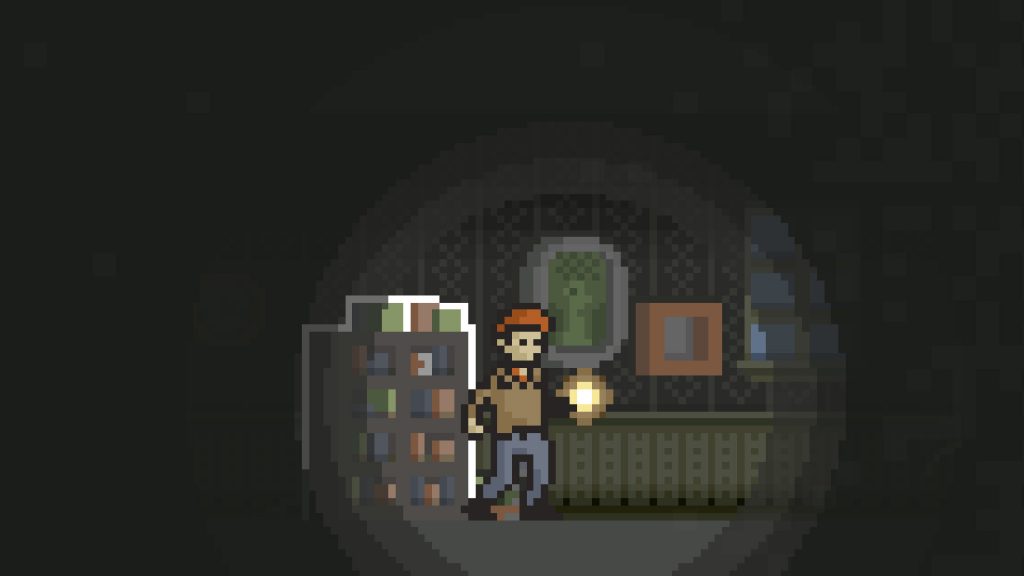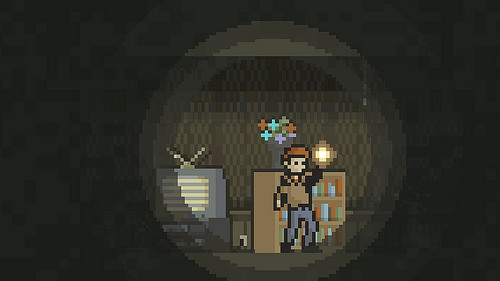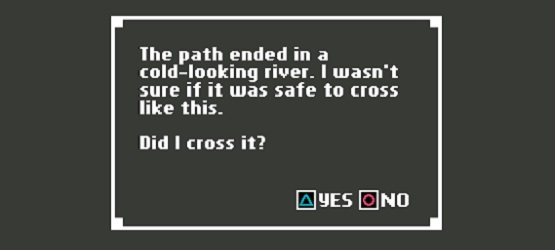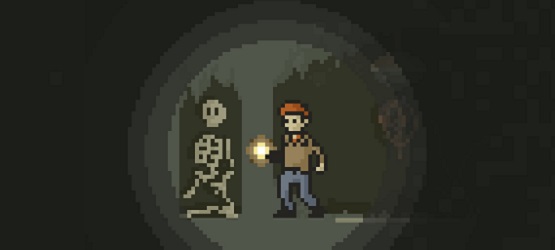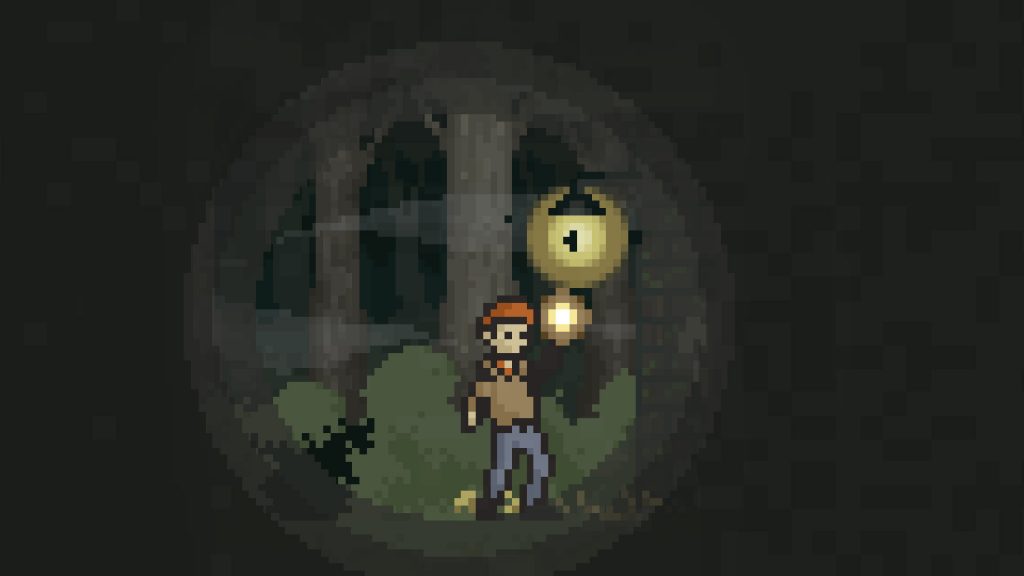Carrying the unnecessary – and not particularly accurate – subtitle of “A unique horror adventure”, Home is a 2D side-scrolling game developed primarily by Benjamin Rivers (although as the game’s credits state, several other people also contributed to the creation of the game). Having previously been released on PC, iOS and PlayStation Vita, not to mention PlayStation 4 in North America, Home has recently arrived on PS4 in Europe.
Home is a pixel-art murder-mystery which casts you as a protagonist who wakes up in a stranger’s house with a limp, a sore head and no memory of how he came to be in this place (we’ve all been there), although his long-term memory seems to be intact. Not only that but the owner of the house is laying dead in the next room, murdered. Armed with nothing but a flashlight, your task is to uncover the truth not only behind the dead man’s murder but also the larger plot that begins to unfold, one in which your character seems to play an integral role, even if he is apparently unaware of the reason why.
Home is essentially a visual novel-style game (although with far less depth and content than your average visual novel), your level of interactivity with the game being limited to walking left and right, looking up, examining and collecting objects, and making the occasional choice. The game’s plot is delivered via past-tense text narration from the protagonist, with text appearing whenever you examine an object as well as at certain predefined points in the game, and your choices are presented to you within this text. For example, at one point you encounter a mouse stuck in a mousetrap – the protagonist describes the situation and the text ends with “Did I free it? YES / NO”.
Although you are sometimes given the choice to pick up an item, there is no inventory management in the game, instead your carried items are automatically used at certain times: if you pick up the handgun then you can return it to its gun rack later in the game; pick up the video cassette and you can watch it if you find a VCR (don’t worry, a vengeful, long-haired Japanese girl doesn’t crawl out of the television); pick up the hammer and you can remove some wooden planks blocking a door. Also, beyond simply retracing the protagonist’s steps in order to further the story, your handful of mandatory objectives involve nothing more complicated than turning a series of valves to drain a pool of water, or finding the key for a particular door. Nothing in Home is going to tax your reflexes or your brain.
Given its lack of gameplay mechanics, the story of Home becomes its primary focus, so it needs to offer a gripping narrative to keep the player pushing onward, holding their interest enough that they want to see the story through to its conclusion. Deciding whether or not the game achieves this is a tough call to make due to the fact that the story changes based on your choices. To quote a promotional description of the game: “As you play the game, it changes… to reflect your perspective… and as you’ll discover, its truths are entirely subjective.”
Personally I’m a big fan of ambiguous and subtle storytelling – in videogames and other mediums – when it’s done right, but forming a full story and then deliberately removing or obscuring certain pieces isn’t the same as just throwing together a load of tenuously connected narrative elements and saying “You figure it out.” And I can’t help but feel that Home veers too far into the latter category, as it doesn’t feel like the answers are hidden beneath the surface but more like the writer never bothered to come up with those answers in the first place, leaving the player to find meaning when there may not actually be much to find.
The first time I completed the game I experienced an anticlimactic conclusion that left me with an obnoxious number of unanswered questions, while my second playthrough – with me deliberately making different choices this time – led to an asinine “unreliable narrator”-style ending that directly contradicted some earlier moments in the story. It’s a shame because the story opens in a gripping manner and the ingredients for a potentially interesting murder-mystery are there, it’s just that these narrative fragments never really come together in any kind of satisfying way. At least, they didn’t for me in my two playthroughs.
I was able to complete two playthroughs of the game in a fairly short space of time because Home is a brief experience, my first playthrough taking me around ninety minutes while my second took around half-an-hour. If you’re inclined to play it in even smaller doses, the game does feature an auto-save system. One benefit to the game’s brevity is that if the story really does grab you and you want to play it through several times then this won’t take up much of your time.
The pixel graphics are simple but work well enough, although you never see much at any one time due to the majority of the screen being covered in darkness, the only light source being the circle of light that surrounds the protagonist due to the flashlight he carries. One graphical touch I liked was the inclusion of first-person screen-transition animations (opening a door, walking up or down stairs) as this reminded me of the early Resident Evil games. Whether or not this was an intentional nod, I don’t know, but as someone with a lot of fondness and appreciation for those games, it made me smile. (No Barry Burton cameo, sadly – now that would have livened up the story).
Home features a decent selection of areas when taking into account its short length, your journey taking you through tunnels, a sewer system, a forest, an abandoned factory, and more. And while Home isn’t really much of a horror experience beyond a few basic jump-scares and the general dark tone, the game does at least manage to maintain an effective atmosphere across its environments, thanks largely to some good sound design, with fitting ambient sounds being used instead of music.
The main problem with Home is that it offers little beyond its story, and the story it does offer can be inconsistent and vague to an annoying degree. I understand that there was a deliberate creative choice behind this and I see what the developer was going for, but that didn’t make the end result any less of a negative point.
If you have an interest in storytelling in videogames and you don’t mind a very open-ended plot with no definite answers or a satisfying conclusion then Home is certainly worth a look, especially given its low price. If, however, you prefer a more fleshed-out and carefully constructed story, not to mention more variety and substance in terms of actual gameplay, then you’re better off leaving Home alone.
Rating – 6
Emily Medlock is an avid gamer whose passions not only include video games of all kinds, but anime, music, movies, and reading.

